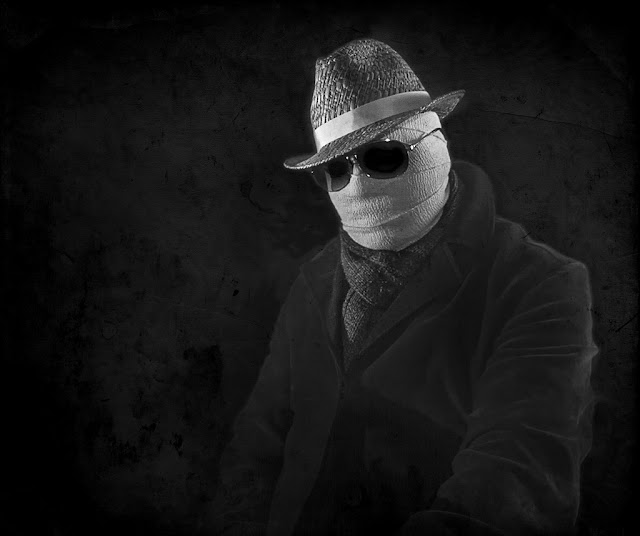Christopher Brown is emerging as one of the hardest hitting voices in science fiction. His stories pack a sense urgency, considering anti-democratic movements, social justice, economic inequality, climate change. Brown is the master of leading us to an image, an inverted moment that resonates, even haunts us until we understand the message.
Brown is a deep well of ideas and experiences. A conversation with Brown is a master class on fiction writing, political science, science fiction, futurism, and pop culture. But what comes through the most is his joy. Laughter punctuated a conversation that could also be thought of as a creative exploration of the mind of a science fiction writer, a writer at the top of his game and loving every second of it.
Brown is a deep well of ideas and experiences. A conversation with Brown is a master class on fiction writing, political science, science fiction, futurism, and pop culture. But what comes through the most is his joy. Laughter punctuated a conversation that could also be thought of as a creative exploration of the mind of a science fiction writer, a writer at the top of his game and loving every second of it.
It seems to me like you've probably had stories in your head for years. But then you broke through, and you got the amazing Tropic of Kansas published. It feels like a work that you had been developing for a decade. Can you tell me the process there?
Not quite a decade, but there were a lot of ideas that had been stewing in my brain that ended up in there. It's definitely that kind of book. Rudy Rucker reviewed it, and he made a comment about how it's one of those books where you can tell it's like everything somebody had been thinking about for a long time. Maybe that came to you critically as well. That book was sort of funny in that I was trying to put a lot of ideas to work in one coherent narrative. I originally wrote a story for an anthology that Joe Lansdale and a guy named Scott Cup edited for the World Fantasy Convention on the centennial of Robert E Howard's birthday. Robert E Howard of Conan the Barbarian fame. One of the constraints of this anthology was you were supposed to write a story featuring a Robert E Howard character or in the style of Howard, but the only rule was you couldn't use Conan because they didn't have the rights. So, I thought, I'll write a Conan story. That's what turned me on to fantastic fiction as an eleven-year-old. I wrote a story that invented this character of Sig, who was like my version of Conan, but he was an out-of-work Blackwater type guy. You know, like B-team, would-be Blackwater guy in post-9/11 Baghdad or post-invasion Baghdad. It was a fun character. It got a great response. It was sort of funny and did this kind of thing I was trying to do, like take the things great about pulp fiction, like Robert E Howard stories, and try to repurpose them towards more emancipatory ends or something like that, something with a little more political edge. I had been mostly just writing short fiction and was keen to write a novel that didn't suck, that I was happy with. As I was starting to write notes for thinking about doing something with this material, there were these #Occupy—kind of crazy quasi-revolutionary #Occupy protester types—who made a camp in this abandoned neon lighting factory across the street from where I live. And every night I'd go to sleep and all these guys were out there, like, planning the uprising, and this was early 2011 and the Arab Spring started happening. And so I had started out planning to write something that was much more like an adventure novel set in the post-9/11 real world, and realized what I really wanted to do was write a story about a popular uprising in the United States. And to do that, you really need to—things would have to be worse than they are, or at least worse than they were then. So, that's where the alternate history came from, and in the process, all this other stuff gets kind of crammed in there, whether it's the outdoorsy stuff or the Internet-based direct democracy stuff. Lots of ideas were in my head.
Not quite a decade, but there were a lot of ideas that had been stewing in my brain that ended up in there. It's definitely that kind of book. Rudy Rucker reviewed it, and he made a comment about how it's one of those books where you can tell it's like everything somebody had been thinking about for a long time. Maybe that came to you critically as well. That book was sort of funny in that I was trying to put a lot of ideas to work in one coherent narrative. I originally wrote a story for an anthology that Joe Lansdale and a guy named Scott Cup edited for the World Fantasy Convention on the centennial of Robert E Howard's birthday. Robert E Howard of Conan the Barbarian fame. One of the constraints of this anthology was you were supposed to write a story featuring a Robert E Howard character or in the style of Howard, but the only rule was you couldn't use Conan because they didn't have the rights. So, I thought, I'll write a Conan story. That's what turned me on to fantastic fiction as an eleven-year-old. I wrote a story that invented this character of Sig, who was like my version of Conan, but he was an out-of-work Blackwater type guy. You know, like B-team, would-be Blackwater guy in post-9/11 Baghdad or post-invasion Baghdad. It was a fun character. It got a great response. It was sort of funny and did this kind of thing I was trying to do, like take the things great about pulp fiction, like Robert E Howard stories, and try to repurpose them towards more emancipatory ends or something like that, something with a little more political edge. I had been mostly just writing short fiction and was keen to write a novel that didn't suck, that I was happy with. As I was starting to write notes for thinking about doing something with this material, there were these #Occupy—kind of crazy quasi-revolutionary #Occupy protester types—who made a camp in this abandoned neon lighting factory across the street from where I live. And every night I'd go to sleep and all these guys were out there, like, planning the uprising, and this was early 2011 and the Arab Spring started happening. And so I had started out planning to write something that was much more like an adventure novel set in the post-9/11 real world, and realized what I really wanted to do was write a story about a popular uprising in the United States. And to do that, you really need to—things would have to be worse than they are, or at least worse than they were then. So, that's where the alternate history came from, and in the process, all this other stuff gets kind of crammed in there, whether it's the outdoorsy stuff or the Internet-based direct democracy stuff. Lots of ideas were in my head.





